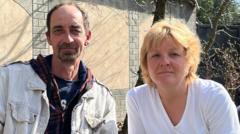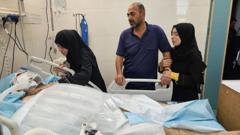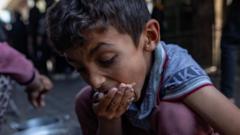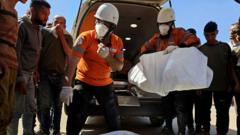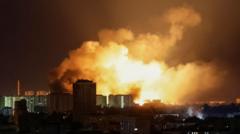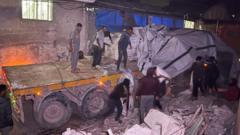As conflict continues in Gaza, a local journalist captures the harrowing experiences of families like that of five-month-old Siwar Ashour, who faces severe malnutrition due to an Israeli blockade. With inadequate supplies and the constant threat of violence, the struggle for survival becomes a daunting daily battle.**
The Dire Reality of a Child's Hunger in Gaza: A Voice from the Ground**
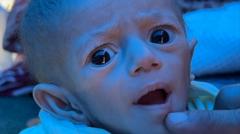
The Dire Reality of a Child's Hunger in Gaza: A Voice from the Ground**
Amidst ongoing conflict, a local reporter documents the heartbreaking plight of a malnourished baby girl and her struggling family in war-torn Gaza.**
As the camera pans over the shattered remains of homes, the silence is unsettling. Children living in war do not express surprise or joy; they exist in a state of numbness, surrounded by grief and unimaginable hunger. Long lines form for meager rations, with many standing for hours without receiving anything. The local cameraman, who has chosen to remain unnamed for safety reasons, tirelessly documents the agonizing conditions faced by families, absorbing the cries of those clinging to survival among the rubble of Gaza.
Today, this cameraman is on a mission to seek out baby Siwar Ashour, a five-month-old girl whose fragile state struck him deeply during a visit to Nasser hospital in Khan Younis. Weighing just over 2 kilograms (4 lbs 6 oz)—far below the healthy average for her age—Siwar was so severely malnourished that her struggles became a heartbreaking symbol of the plight faced by many in Gaza. She requires a special milk formula that is scarce due to the ongoing blockade.
While Siwar has been discharged from the hospital, her conditions remain precarious. As he traverses the streets of Khan Younis—now a stark reflection of shelter made from tarps and metal sheets—he finds the young family. Inside their cramped one-bedroom dwelling, Siwar's mother, Najwa, reveals that despite being sent home with a can of formula, their supplies are dwindling, and her daughter's weight is not improving.
"She needs specific formula, but we can only find a single can," Najwa complains, her eyes heavy with fatigue. Flies buzz around them as she gently wraps Siwar in a scarf to shield her from both insects and the horrors of their circumstance. The sounds of war that have accompanied Siwar since birth resonate through their fragile walls, evoking fear and distress whenever the distant booms of artillery shatter the atmosphere.
Amidst the struggles, Najwa reveals a deeper issue—her own malnutrition prevented her from breastfeeding, further compounding the challenges each day brings. With both Najwa and her mother, Reem, facing their own nutritional battles, they find it increasingly difficult to secure basic essentials. The ongoing blockade has left them grappling with exorbitant prices for baby formula and other necessities as they maintain hope amid despair.
Israel's military claims to have ensured that food supplies continue to flow into Gaza, denying any crisis; however, local families, aid agencies, and humanitarian organizations worldwide refute these assertions, emphasizing the critical shortages plaguing the region. UN officials have criticized the amount of aid allowed into Gaza as exceedingly insufficient, describing the humanitarian situation as "the cruellest phase" of an already brutal conflict.
Nearing what feels like an unending cycle of despair, Najwa muses on their plight: "There is no future to think about, just surviving each day." As the conflict rages on, the realities for millions in Gaza become increasingly dire, with stories like Najwa's and Siwar's highlighting the urgent need for assistance that seems perpetually out of reach.

